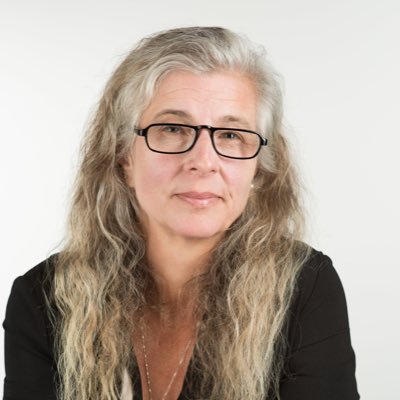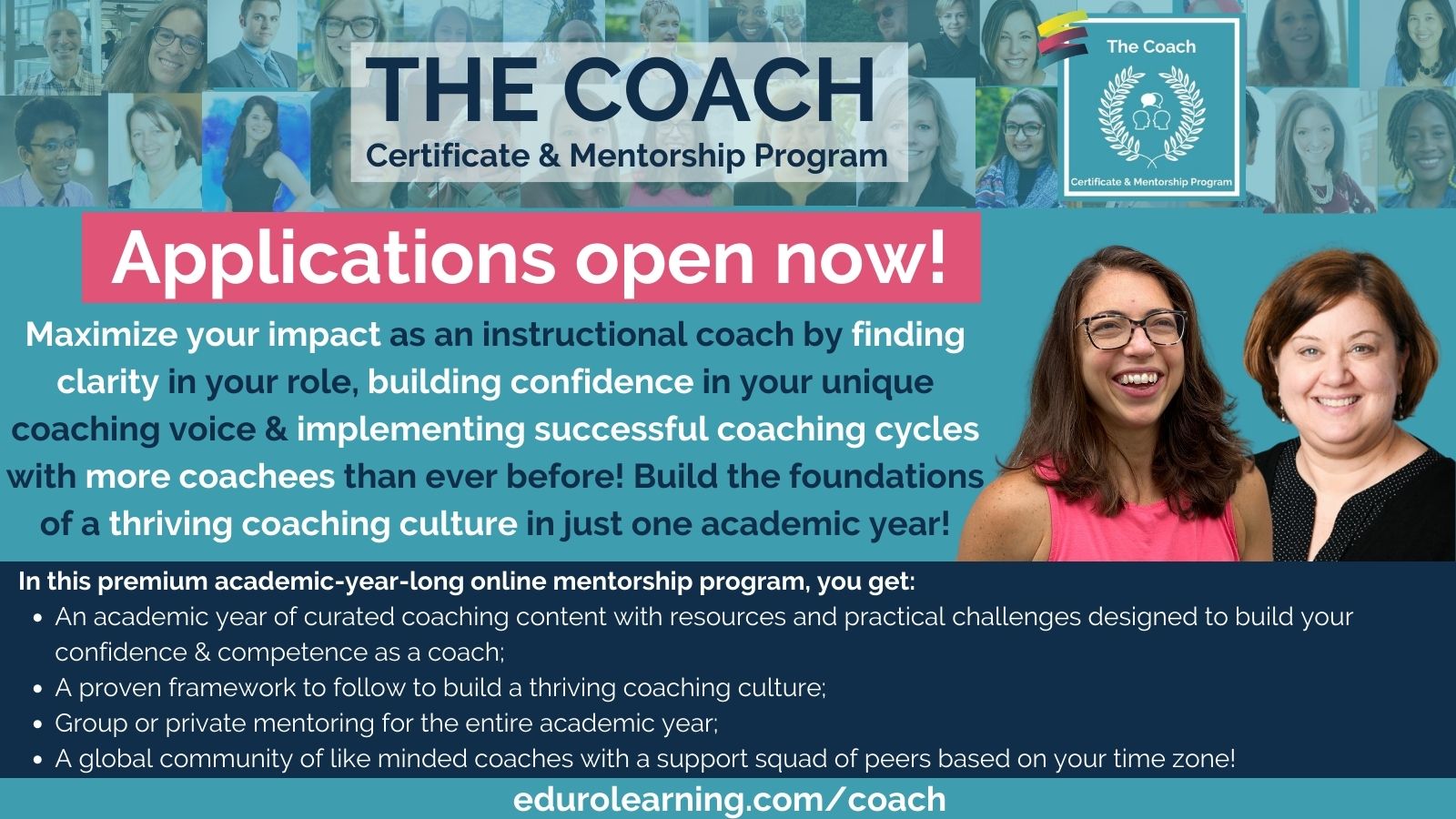In this episode, Clint and Kim are chatting with Silvia Tolisano, author of A Guide to Documenting Learning: Making Thinking Visible, Meaningful, Shareable, and Amplified. Their conversation focuses on two main themes: the elements that make professional learning successful, as well as the keys to successfully documenting learning – for teacher professional growth, and for students. They talk about the power of encouraging teachers to be a learner, rather than focusing on student learning before they can truly understand the process of connected learning. Silvia’s varied experience in many different countries, and many different roles both within and beyond individual schools, helps identify the ways that we can keep deep self-reflective learning at the forefront of everything we do!
Subscribe to #coachbetter via your favorite Podcast Player!
Featured Guest

Bonus! Watch the Spotlight Version on YouTube!
Show Notes
Born in Germany, went to public school. Moved to Argentina for high school, went to private German International School. Started university in Argentina, went to public university in the United States. Became a teacher, taught in public middle school, then went on to private school, and then taught at an international school. Full-time coach and consultant.
Value of being a Third Culture Kid (TCK)?
Used to “being the kid who left” – thrives on “not being the one was left”. Loved being someone new in private school, not being the “sister of”.
Something you’re excited about in terms of learning / learning innovation
A year ago, A Guide to Documenting Learning was published. Working with her old high school in Argentina. On the 5th year of her work with them on documenting learning. Finally seeing all the puzzle pieces fitting together.
The framework is a blended coaching approach. Contract with the school for the entire school year.
Physically fly to campus for bootcamp of 5 consecutive days, to get to know cohort members. Have a small group of 5-7 to focus on them and support them throughout the year. Trying to gain a common vocabulary. Starting from scratch, some don’t know how to put an attachment on an email, some are already using social media. Need to be very careful that we’re not speaking at cross-purposes. Need to establish a common language: “Are you literate?” Need a certain type of skills and fluency to continue to work with Silvia when she’s not there. Each cohort member has a blog where they are documenting their own learning and reflecting on that learning.
When Silvia’s not there, 1:1 virtual coaching, group seminars, focus on different challenges throughout the year. Wants them to experience these in their own learning so they can translate into their teaching practice.
Based not just on pedagogy, but on Heutagogy, based on self directed and self motivated learning. Building a learning network that will last you beyond our year of coaching is critical. You need to want to continue learning.
Tipping point was the 4th cohort of administrators, when they became the learners side by side with teachers.
What structures are in place at the school to make this successful?
Not sure there are structures in place. Building the plane while it’s flying. One principal participated in the second cohort. Cohort members every year are continuing to express how it changed their lives. “I can never go back to the way I taught before.” The awareness and enthusiasm. When teachers were making changes in their classroom, they started seeing parent pushback. Now learning how to take parents along the way, admin felt like they needed to have the experience, to be able to understand and validate it to parents.
There are other initiatives at the school, and admin needed to see how it all fits together.
What impacts are you seeing on student learning as teachers are coming on board?
Kids are resilient. Kids can transition between a more “traditional” style of teaching, and a more “modern” style of teaching. Kids are not stupid: they know that filling out a worksheet doesn’t require as much “thinking” as more in depth work, so there is a lot of push back. “Can we just do it the old way?” because it’s easier. Incredible opportunity for students to take what they’ve learned and apply it outside of school. Teachers who are now receiving students who were taught by teachers in former cohorts, can tell which students were taught that way.
What are the key elements of documenting learning?
Big fan of MTV: Making Thinking Visible, made her own 5 steps: knowing how to look for learning. Each step is connected to a mindset and skillset. If I see learning, can I recognize it? If I see the absence of learning, can I recognize it?
- Look for Learning: We need a common language of what will we accept as evidence of learning so that we can look for that evidence? As long as we have teachers or parents who accept proper spelling as learning (for example)
- Capture Learning: How do you make learning visible. Capture learning in all types of media form (not just in images or video). How do you keep that moment of learning lasting, to be able to unpack it?
- Reflect on Learning: Is it enough to just think about your learning? Can you tell someone else?
- Sharing Learning: How do you make those artifacts that you looked for, captured, and reflected on – how do you share that for your own learning and the learning of others?
- Amplify Learning: Not just sharing with local colleagues, but share beyond the school walls. How do you share your learning with people you will never meet? How do you though strategic dissemination of learning, open yourself up to opportunities that will come back to you that you could never imagine that it could happen to you?
Now Literacies: network literacy, information literacy, global literacy
I want to broaden the horizon to possibilities that could potentially exist. I’m not there to teach my students, but to provide those opportunities.
How do you help teachers get over the hurdle of understanding?
Cohorts were not mandated. Very different than a required learning environment. Constantly stress, you will get out of this what you put into it. I am there to throw out seeds. You are the one to decide which ones you will water. I don’t own the learning in this coaching relationship.
Teachers who have imagination will run with it. Those that can see themselves as scientists and researchers, for the greater good of pushing education forward. All of us are pioneers and all of us are going where no man has gone before.
I believe teachers have to experience these types of learning for themselves, before they can take that leap for their students. There are some teachers who are unconsciously always thinking about their students. Leave your teacher hat off. I need you to have your learner hat on.
If we focus on teachers as learners, it will automatically translate into the classroom. If it focuses on the student learning it doesn’t automatically translate into teacher learning.
Almost all research about coaching focus on student learning. How do we reconcile this with focusing on teachers as learners?
It’s about self-directed and self-motivated learning. Learner-centered learning. It’s the idea of waking the learner up within the teacher.
19th century learning style, with teachers who went to school in the 20th century, teaching kids in school in the 21th century, who will live into the 22nd century.
Level Up Your Coaching with The Coach!
If you are ready to dive deep into your coaching practice, to help you #coachbetter and build a thriving coaching culture in your school, please join us for our next cohort of The Coach!
Wherever you are in building a coaching culture in your school, The Coach will give you the strategies, skills and tools you need to make coaching a success and will empower you to confidently apply instructional coaching strategies in any situation – from building a coaching program, to having coaching conversations, to being a leader in your school community. We facilitate only one cohort each academic year so we can offer individualized support for each participant.
Coaches of all levels are welcome: you’ll start the program with a self-assessment to determine exactly what the next steps are for you!
Registration for our next global cohort opens once a year – check the website for details!

![The Power of Documenting Learning with Silvia Tolisano [Ep 60]](https://res.cloudinary.com/edurolearning/image/upload/v1565514058/coachbetter%20Podcast/coachbetter_spotlight_silviatolisano_ep60_p1tw30.jpg)




Recent Comments